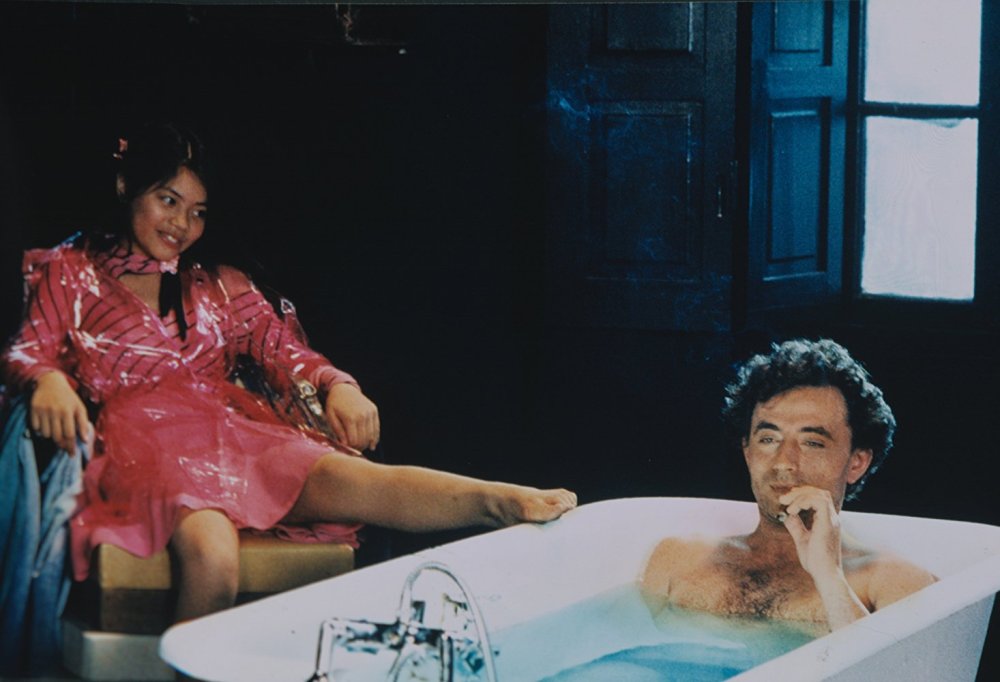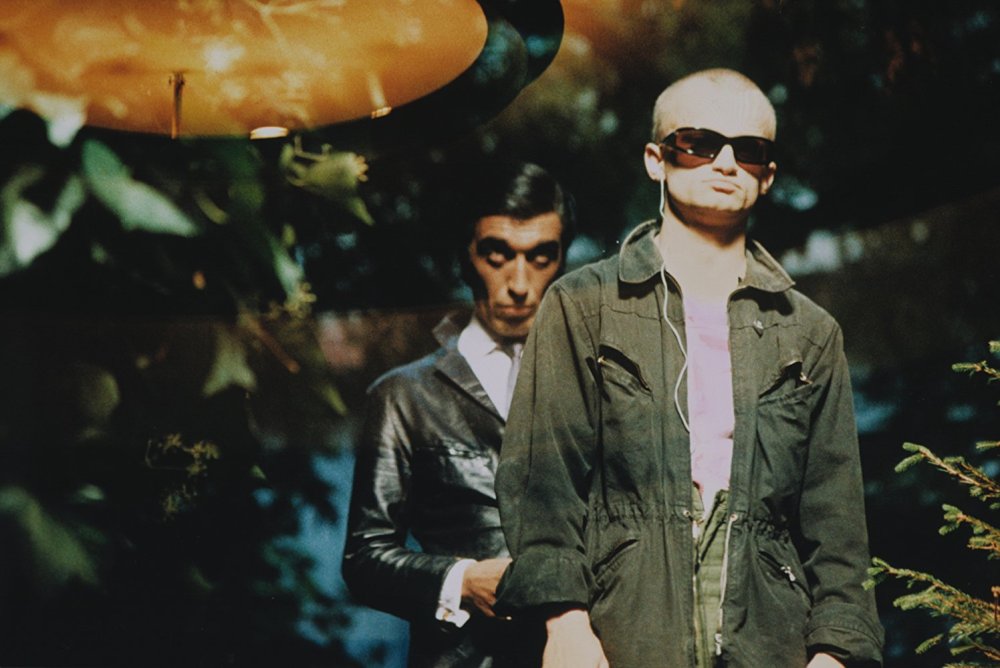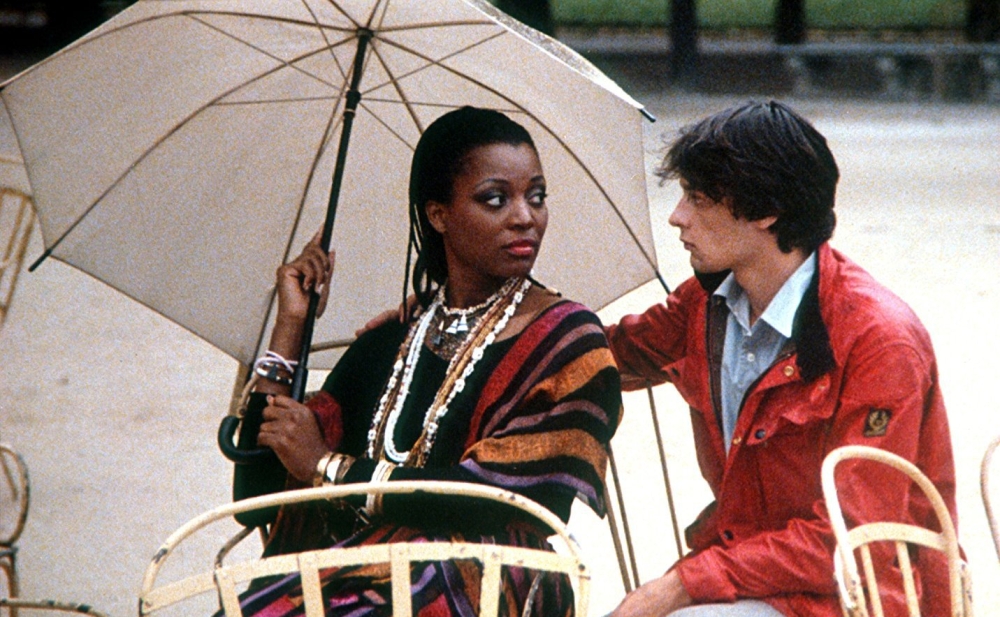
“An American Werewolf in London”
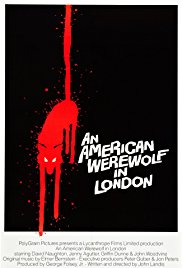 It’s not the Warren Zevon song. John Landis went for literal werewolves in his 1981 movie “An American Werewolf in London.”
It’s not the Warren Zevon song. John Landis went for literal werewolves in his 1981 movie “An American Werewolf in London.”
When I stopped in a London movie theater, I luckily didn’t run into any werewolves myself, just this movie (it also wasn’t a porno theater). With several hit comedies under his belt, Landis moved on to horror, which could also be considered the dark side of comedy. Only, he really didn’t move on, as he stuck with all his comedic beats for “Werewolf,” which go for a lot of laughs to go along with the terror.
It’s a pretty standard horror setup really: Americans David (David Kessler) and Jack (Griffin Dunne) go backpacking in Europe, and they do some foolish things and get themselves attacked by a strange creature. Jack dies, and David (who just so happened to be played by the better actor) is spared, but is also left haunted by the prospect of turning into a werewolf himself and mauling the people around him.
Landis offers his own comedic touch to it, with Jack returning from the dead to check in on David numerous times, with mangled flesh (a lot of great makeup in this movie) and a grudge against David for getting him killed (he finds being dead to be a pretty dull experience). Jack, waking up in the hospital finds himself attended to by Pretty Nurse Alex (Jenny Agutter), who — it being the ’80s — almost instantly falls madly in love with him and decides to take him home with her. It makes you wonder if it’s common practice in the U.K. for nurses to take home their patients. Talk about your work following you home. Plain-looking dudes have it good in the movies — especially in the ’80s — with beautiful women constantly fawning at the very sight of them. In this case, Alex practically falls directly into David’s lap.
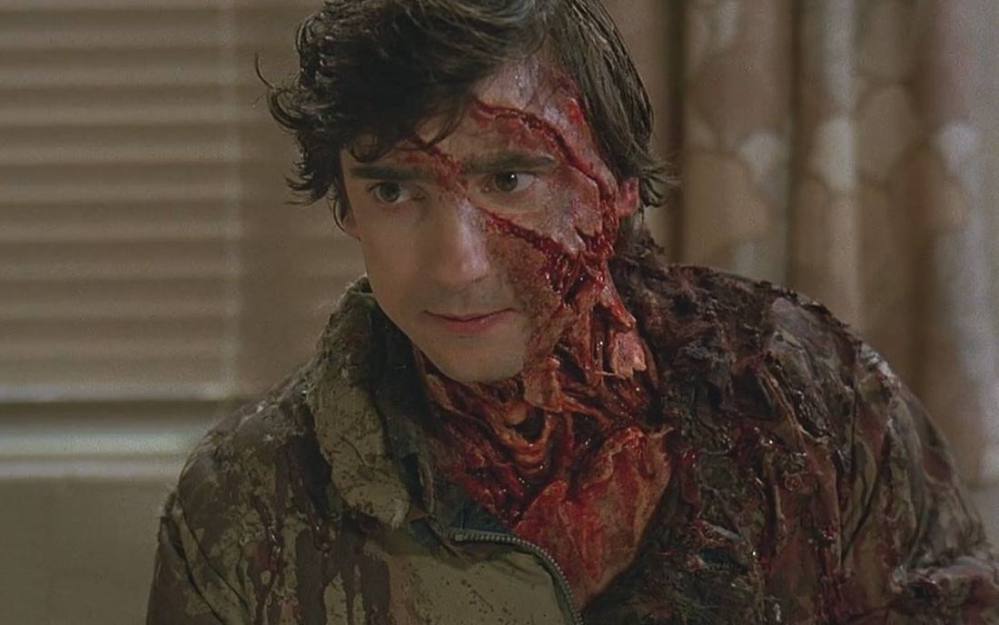
The moral is don’t get killed by a werewolf.
The movie does a good job of playing up David’s creeping fears that he, in fact, was bitten by a werewolf — despite his doctor trying to convince him that it was an “escaped lunatic” who had attacked him — with the next realization naturally being that he will become a werewolf himself and attack and eat people.
David’s apparent lycanthropy is strongly played up as an allegory for mental illness or trauma. David is haunted by dreams of himself running through the woods naked and attacking a dear and a pack of werewolf Nazis invading his house and killing his family. The audience finds out David is Jewish, which Alex joked about, having seen the state of his penis, so it makes sense that he has a nightmare about Nazis. Once David has actually made the transformation to werewolf and gone on a deadly rampage, he fears it will happen again, but can come up with no way to stop himself from turning again. Jack’s ghost or apparition continues to appear to David (in increasing states of decay each time), along with the other people David has killed. They all tell him he needs to kill himself to stop the bloodline of the werewolf and to prevent himself from killing more and risk spreading the disease onto some other poor unassuming soul. These are all variations on devices movies tend to use to denote mental illness.
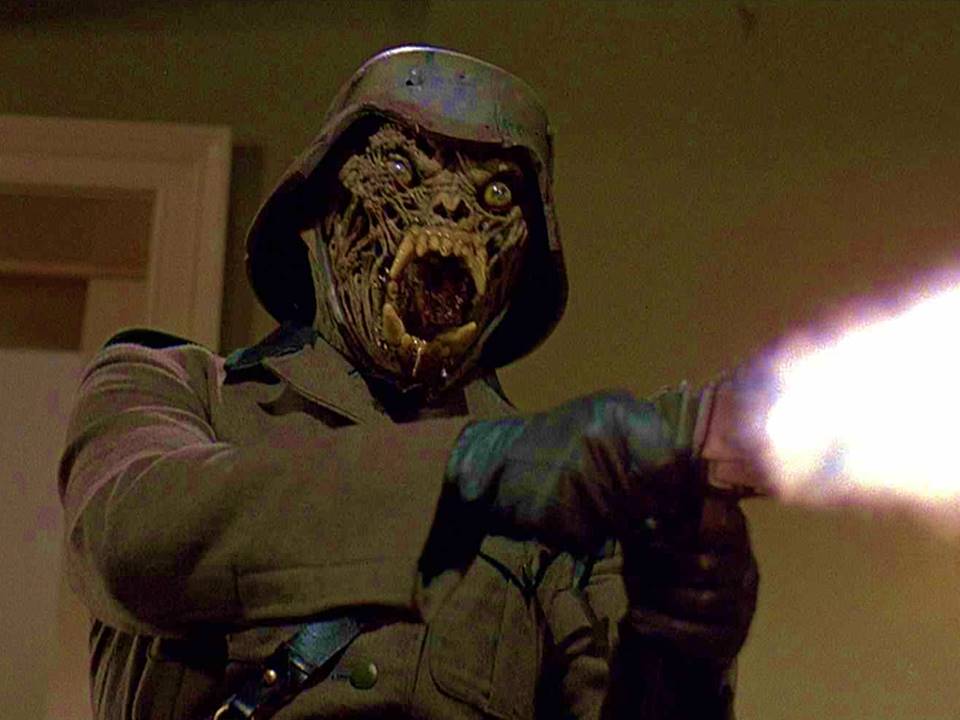
Not just werewolves, not just Nazis, but werewolf Nazis.
Comparing a furry killing machine to a person with mental illness borders on demonizing the mentally ill. Fear and mistreatment of the mentally ill has long been a major failing in society, and especially in the U.S., and continues to be today, as mentally ill is the term the media and politicians continuously use to describe the perpetrators of tragic massacres, such as school shootings.
The cry from the U.S. government has consistently been that there needs to be better treatment of mental illness, even though no improvements are ever made, and the government usually responds by shrinking health coverage even more than it already has. Despite racism, misogyny, easy access to guns all being seemingly common factors in these types of attacks, mental illness and violent movies and video games are usually treated as the culprits.
Mental illness is a serious issue, as someone who suffers from it can be a danger to themselves, and sometimes to others, and it does need to be addressed for the sake of people who live with it. So, it’s good to see movies take on the issue, though it is a sensitive one.
But if you narrow the scope of “mental illness” to people who have a propensity for violent behavior (or sociopaths), then there is certainly an important conversation to be had.
Once undead Jack warns David that he’s going to turn into a werewolf, David’s main concern becomes that Jack’s prophetic message will come true and that he will transform and kill people. Despite David desperately not wanting that to happen, there is nothing he can do to stop it. David’s doctor eventually does come to the realization that David might indeed be correct in his worries, but he comes to that realization too late to do anything. When David does begin to seek help, people treat him as if he is “insane” (which would be debatable), but they don’t do anything to help him. He finds himself alone in his problem, left to his thoughts and his demons.
The eventual solution to David’s problem is that the police kill him. That’s trending a little too much toward a fascist solution for dealing with violent or even potentially violent people, and a solution police in the U.S. unfortunately seem to be taking more often. But it doesn’t seem as if Landis wanted his audience to be comfortable or satisfied with that grisly ending. The director basically offers up his worst-case scenario for the situation, in which everything goes as badly as it possibly can, and he leaves it up to the audience as to how things could be done differently.
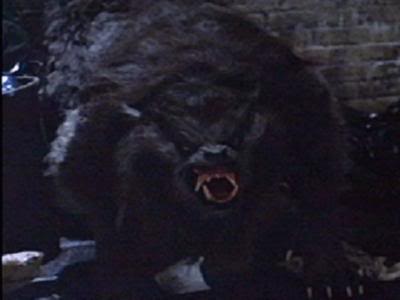
He looks like a good scratch behind the ears might calm him down. The actual werewolf might have looked good in 1981, but he has not aged particularly well.
Obviously, better access to mental health care would be a great step in the right direction, but that would cost the government (and taxpayers) money it isn’t willing to spend. Making access to deadly weapons more difficult would help (could you imagine a werewolf with a gun?), but the NRA has a stranglehold on the government in regard to that issue. How about taking steps to address virulent racism and misogyny propagated on the internet? A common response lately tends to be that the victims are actually the ones at fault (walk up, not out). There is a necessary conversation to be had here, but in truth, the conversations have been had, and ultimately, the people who have the power to improve things don’t want to … so things are the way they are.
The question the movie poses most prominently is in a similar vein to the question posed pertaining to the Joker in the “Dark Knight,” and that is: What do you do with a person who poses an uncompromising threat to others? It’s a little different in that the Joker has an impenetrable ideology predicated on perpetuating violence and chaos, but David is unable to control his propensity for violence. But the intent of the “violent person” really isn’t as important as coming up with a solution that both protects the people around them while still being respectful of their humanity. There was no end to the Joker’s scheming, so there really wasn’t a solution to that issue. There could have been a means to protect David from others, as well as himself because he had the desire to do what was right. But the societal pieces were not in place for him to be treated for his condition.
It’s a question that society has been plagued by since way before 1981. Of course, there is no be all, end all solution for what to do with violent people. But there are ways to curb violent behavior, like taking steps toward better mental health programs and gun control. Maybe none of those things would stop a werewolf, but luckily, werewolves don’t exist (that anyone knows of).
There’s probably something to be said about an American who travels to Europe and winds up terrorizing a city. Maybe it’s intended to be a darkly humorous take on Americans’ propensity to take advantage of other people wherever they go, or possibly just taking the annoyance of tourists to a new, ridiculous level. Perhaps it’s a mildly exaggerated recounting of some of Landis’ own personal experiences, since he wrote the movie along with directing it.
This wasn’t the first comedic horror movie, but the subgenre has really taken off since then, offering up many great entries, like Edgar Wright’s Cornetto Trilogy, and “Shaun of the Dead” in particular, which billed itself as a “Romantic comedy. With zombies,” and also the best picture nominated “Get Out,” which took blurring the line between comedy and horror to a new level.
But in the end, “An American Werewolf in London” makes for a fun and frightful freak show that doesn’t require any deep thinking to enjoy. You folks back in 2018 would do fine to give it a look.
I’m going to continue my globe trotting, next looking at “Raiders of the Lost Ark.” That one’s pretty popular from what I remember. On my way, I’ll make sure to stay on the road, keep clear of the moors. Oh shit, the moon is full! I’d better get going…

 When the author of this piece made his stop in France, he stumbled into a small theater, whereupon, ooh la la, he happened to catch an early new wave gangster film called “Diva.” Directed by Jean-Jacques Beineix, “Diva” is pretty unique for the subgenre, following a young French postman as he tries to escape from the gangsters who are after him, looking for an incriminating tape that unfortuitously falls into his possession.
When the author of this piece made his stop in France, he stumbled into a small theater, whereupon, ooh la la, he happened to catch an early new wave gangster film called “Diva.” Directed by Jean-Jacques Beineix, “Diva” is pretty unique for the subgenre, following a young French postman as he tries to escape from the gangsters who are after him, looking for an incriminating tape that unfortuitously falls into his possession.